Mental Health Recovery: History, Principles, and Challenges Analysis
VerifiedAdded on 2022/09/05
|10
|2464
|34
Essay
AI Summary
This essay provides a comprehensive overview of mental health recovery, exploring the historical context of mental illness in Australia and the evolution of societal attitudes. It delves into the various societal challenges that individuals with mental illness face, including stigma, discrimination, and limited opportunities, and how these challenges impact the recovery process. The essay then analyzes the principles of a recovery-oriented approach, highlighting the importance of individual uniqueness, empowerment, rights protection, dignity, partnership, and progress tracking. It emphasizes how these principles can be incorporated into mental health care to reduce stigma, promote treatment adherence, and improve the quality of life for individuals with mental illness. The essay concludes by advocating for a holistic approach to mental health care that addresses both individual needs and broader societal issues.
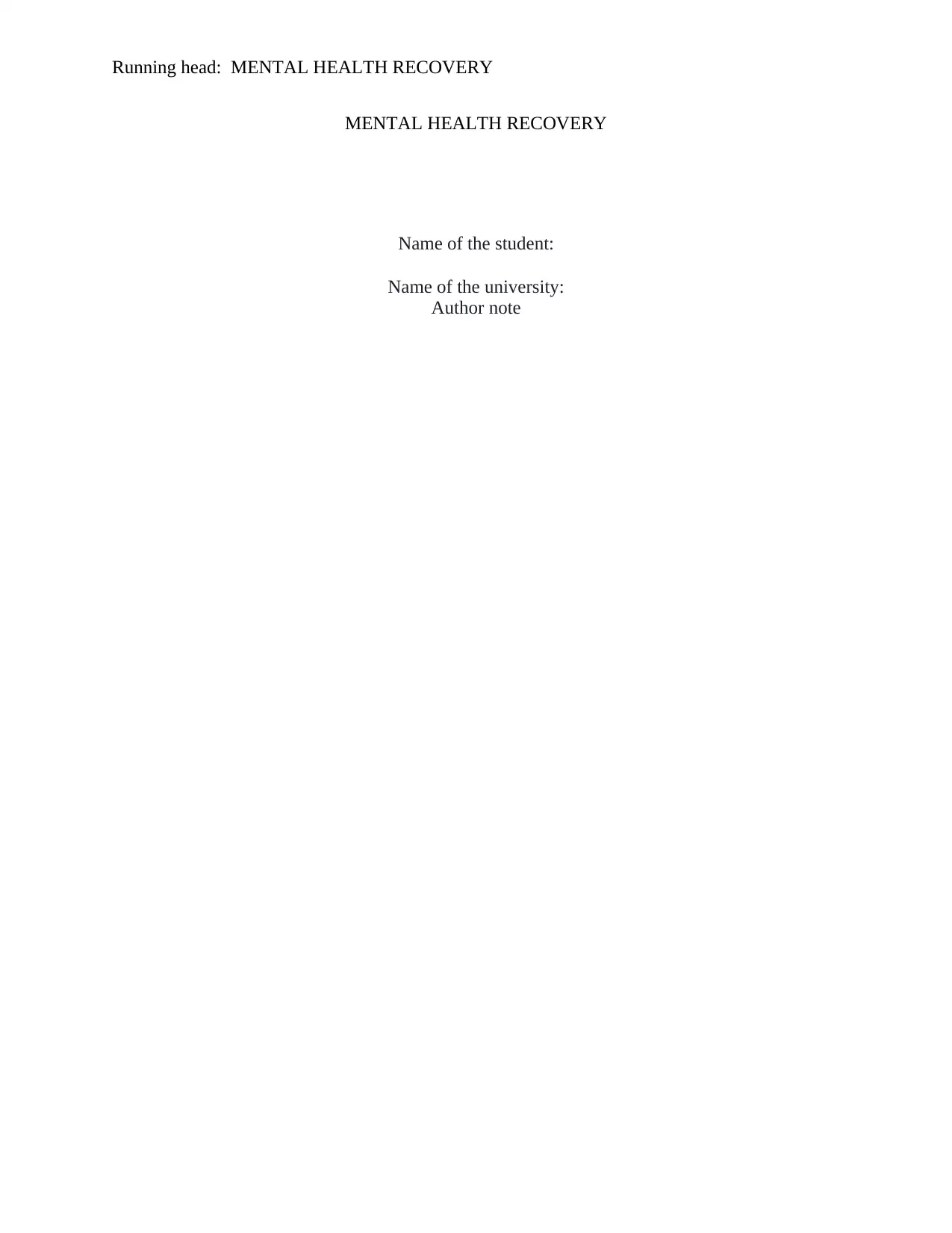
Running head: MENTAL HEALTH RECOVERY
MENTAL HEALTH RECOVERY
Name of the student:
Name of the university:
Author note
MENTAL HEALTH RECOVERY
Name of the student:
Name of the university:
Author note
Paraphrase This Document
Need a fresh take? Get an instant paraphrase of this document with our AI Paraphraser
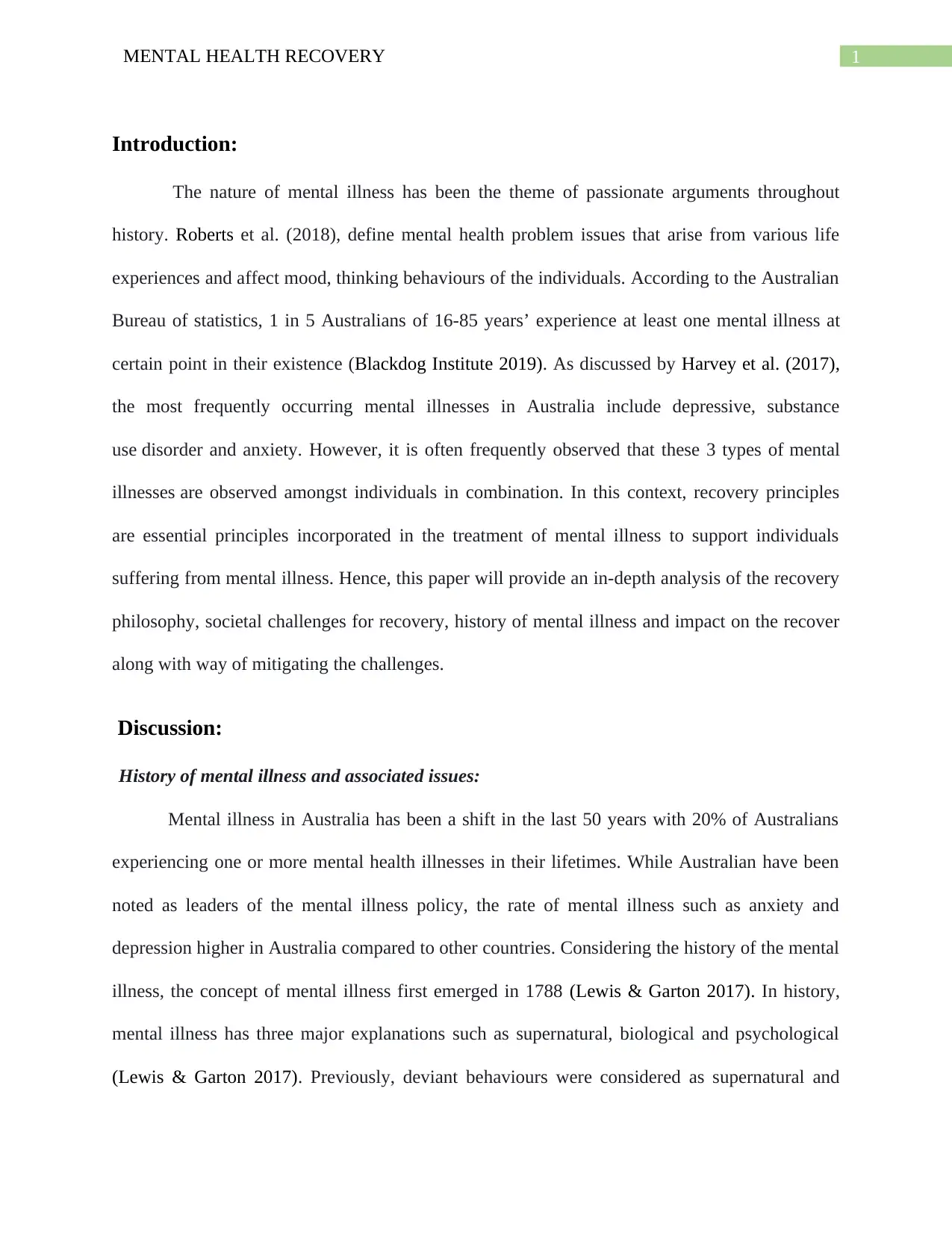
1MENTAL HEALTH RECOVERY
Introduction:
The nature of mental illness has been the theme of passionate arguments throughout
history. Roberts et al. (2018), define mental health problem issues that arise from various life
experiences and affect mood, thinking behaviours of the individuals. According to the Australian
Bureau of statistics, 1 in 5 Australians of 16-85 years’ experience at least one mental illness at
certain point in their existence (Blackdog Institute 2019). As discussed by Harvey et al. (2017),
the most frequently occurring mental illnesses in Australia include depressive, substance
use disorder and anxiety. However, it is often frequently observed that these 3 types of mental
illnesses are observed amongst individuals in combination. In this context, recovery principles
are essential principles incorporated in the treatment of mental illness to support individuals
suffering from mental illness. Hence, this paper will provide an in-depth analysis of the recovery
philosophy, societal challenges for recovery, history of mental illness and impact on the recover
along with way of mitigating the challenges.
Discussion:
History of mental illness and associated issues:
Mental illness in Australia has been a shift in the last 50 years with 20% of Australians
experiencing one or more mental health illnesses in their lifetimes. While Australian have been
noted as leaders of the mental illness policy, the rate of mental illness such as anxiety and
depression higher in Australia compared to other countries. Considering the history of the mental
illness, the concept of mental illness first emerged in 1788 (Lewis & Garton 2017). In history,
mental illness has three major explanations such as supernatural, biological and psychological
(Lewis & Garton 2017). Previously, deviant behaviours were considered as supernatural and
Introduction:
The nature of mental illness has been the theme of passionate arguments throughout
history. Roberts et al. (2018), define mental health problem issues that arise from various life
experiences and affect mood, thinking behaviours of the individuals. According to the Australian
Bureau of statistics, 1 in 5 Australians of 16-85 years’ experience at least one mental illness at
certain point in their existence (Blackdog Institute 2019). As discussed by Harvey et al. (2017),
the most frequently occurring mental illnesses in Australia include depressive, substance
use disorder and anxiety. However, it is often frequently observed that these 3 types of mental
illnesses are observed amongst individuals in combination. In this context, recovery principles
are essential principles incorporated in the treatment of mental illness to support individuals
suffering from mental illness. Hence, this paper will provide an in-depth analysis of the recovery
philosophy, societal challenges for recovery, history of mental illness and impact on the recover
along with way of mitigating the challenges.
Discussion:
History of mental illness and associated issues:
Mental illness in Australia has been a shift in the last 50 years with 20% of Australians
experiencing one or more mental health illnesses in their lifetimes. While Australian have been
noted as leaders of the mental illness policy, the rate of mental illness such as anxiety and
depression higher in Australia compared to other countries. Considering the history of the mental
illness, the concept of mental illness first emerged in 1788 (Lewis & Garton 2017). In history,
mental illness has three major explanations such as supernatural, biological and psychological
(Lewis & Garton 2017). Previously, deviant behaviours were considered as supernatural and
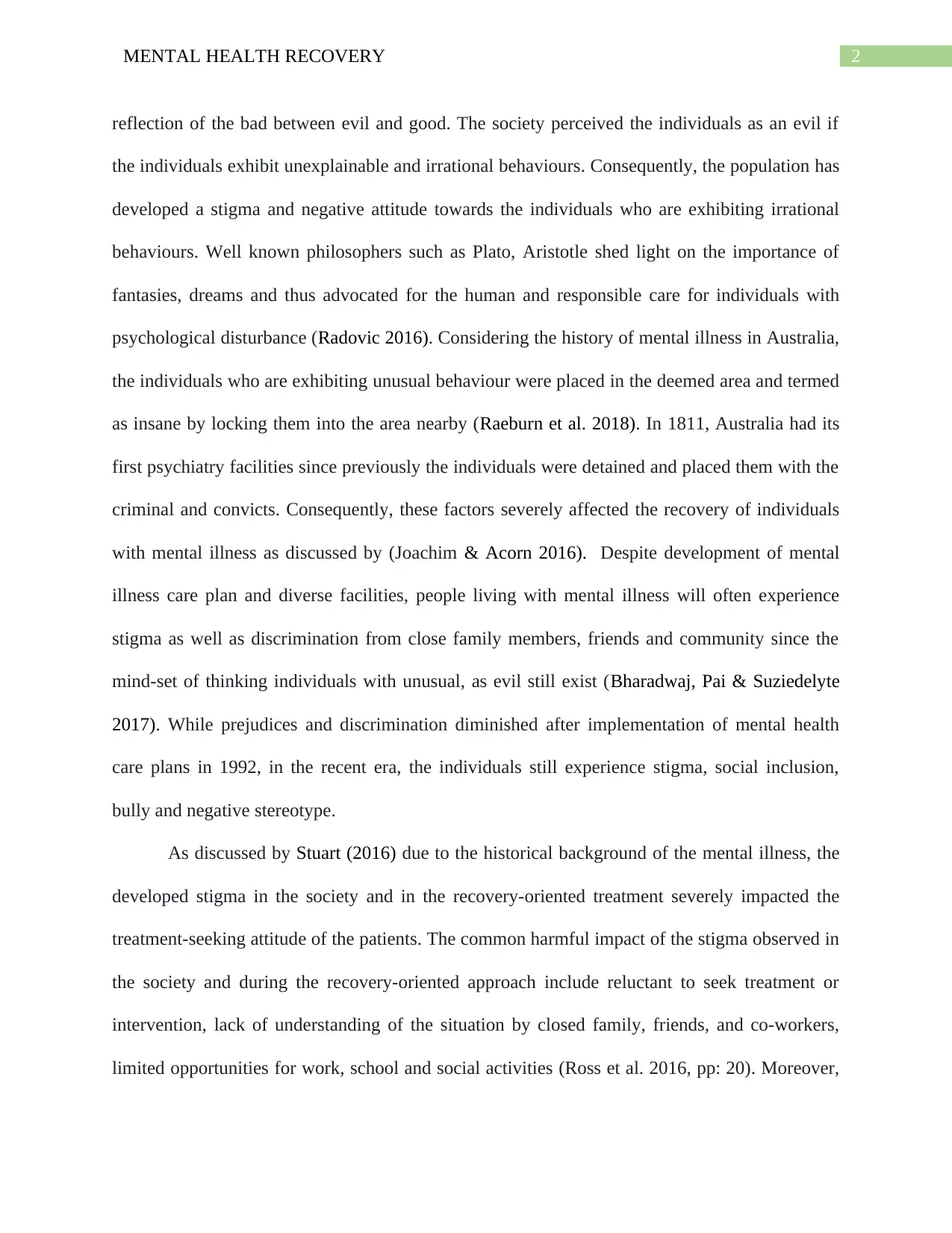
2MENTAL HEALTH RECOVERY
reflection of the bad between evil and good. The society perceived the individuals as an evil if
the individuals exhibit unexplainable and irrational behaviours. Consequently, the population has
developed a stigma and negative attitude towards the individuals who are exhibiting irrational
behaviours. Well known philosophers such as Plato, Aristotle shed light on the importance of
fantasies, dreams and thus advocated for the human and responsible care for individuals with
psychological disturbance (Radovic 2016). Considering the history of mental illness in Australia,
the individuals who are exhibiting unusual behaviour were placed in the deemed area and termed
as insane by locking them into the area nearby (Raeburn et al. 2018). In 1811, Australia had its
first psychiatry facilities since previously the individuals were detained and placed them with the
criminal and convicts. Consequently, these factors severely affected the recovery of individuals
with mental illness as discussed by (Joachim & Acorn 2016). Despite development of mental
illness care plan and diverse facilities, people living with mental illness will often experience
stigma as well as discrimination from close family members, friends and community since the
mind-set of thinking individuals with unusual, as evil still exist (Bharadwaj, Pai & Suziedelyte
2017). While prejudices and discrimination diminished after implementation of mental health
care plans in 1992, in the recent era, the individuals still experience stigma, social inclusion,
bully and negative stereotype.
As discussed by Stuart (2016) due to the historical background of the mental illness, the
developed stigma in the society and in the recovery-oriented treatment severely impacted the
treatment-seeking attitude of the patients. The common harmful impact of the stigma observed in
the society and during the recovery-oriented approach include reluctant to seek treatment or
intervention, lack of understanding of the situation by closed family, friends, and co-workers,
limited opportunities for work, school and social activities (Ross et al. 2016, pp: 20). Moreover,
reflection of the bad between evil and good. The society perceived the individuals as an evil if
the individuals exhibit unexplainable and irrational behaviours. Consequently, the population has
developed a stigma and negative attitude towards the individuals who are exhibiting irrational
behaviours. Well known philosophers such as Plato, Aristotle shed light on the importance of
fantasies, dreams and thus advocated for the human and responsible care for individuals with
psychological disturbance (Radovic 2016). Considering the history of mental illness in Australia,
the individuals who are exhibiting unusual behaviour were placed in the deemed area and termed
as insane by locking them into the area nearby (Raeburn et al. 2018). In 1811, Australia had its
first psychiatry facilities since previously the individuals were detained and placed them with the
criminal and convicts. Consequently, these factors severely affected the recovery of individuals
with mental illness as discussed by (Joachim & Acorn 2016). Despite development of mental
illness care plan and diverse facilities, people living with mental illness will often experience
stigma as well as discrimination from close family members, friends and community since the
mind-set of thinking individuals with unusual, as evil still exist (Bharadwaj, Pai & Suziedelyte
2017). While prejudices and discrimination diminished after implementation of mental health
care plans in 1992, in the recent era, the individuals still experience stigma, social inclusion,
bully and negative stereotype.
As discussed by Stuart (2016) due to the historical background of the mental illness, the
developed stigma in the society and in the recovery-oriented treatment severely impacted the
treatment-seeking attitude of the patients. The common harmful impact of the stigma observed in
the society and during the recovery-oriented approach include reluctant to seek treatment or
intervention, lack of understanding of the situation by closed family, friends, and co-workers,
limited opportunities for work, school and social activities (Ross et al. 2016, pp: 20). Moreover,
⊘ This is a preview!⊘
Do you want full access?
Subscribe today to unlock all pages.

Trusted by 1+ million students worldwide
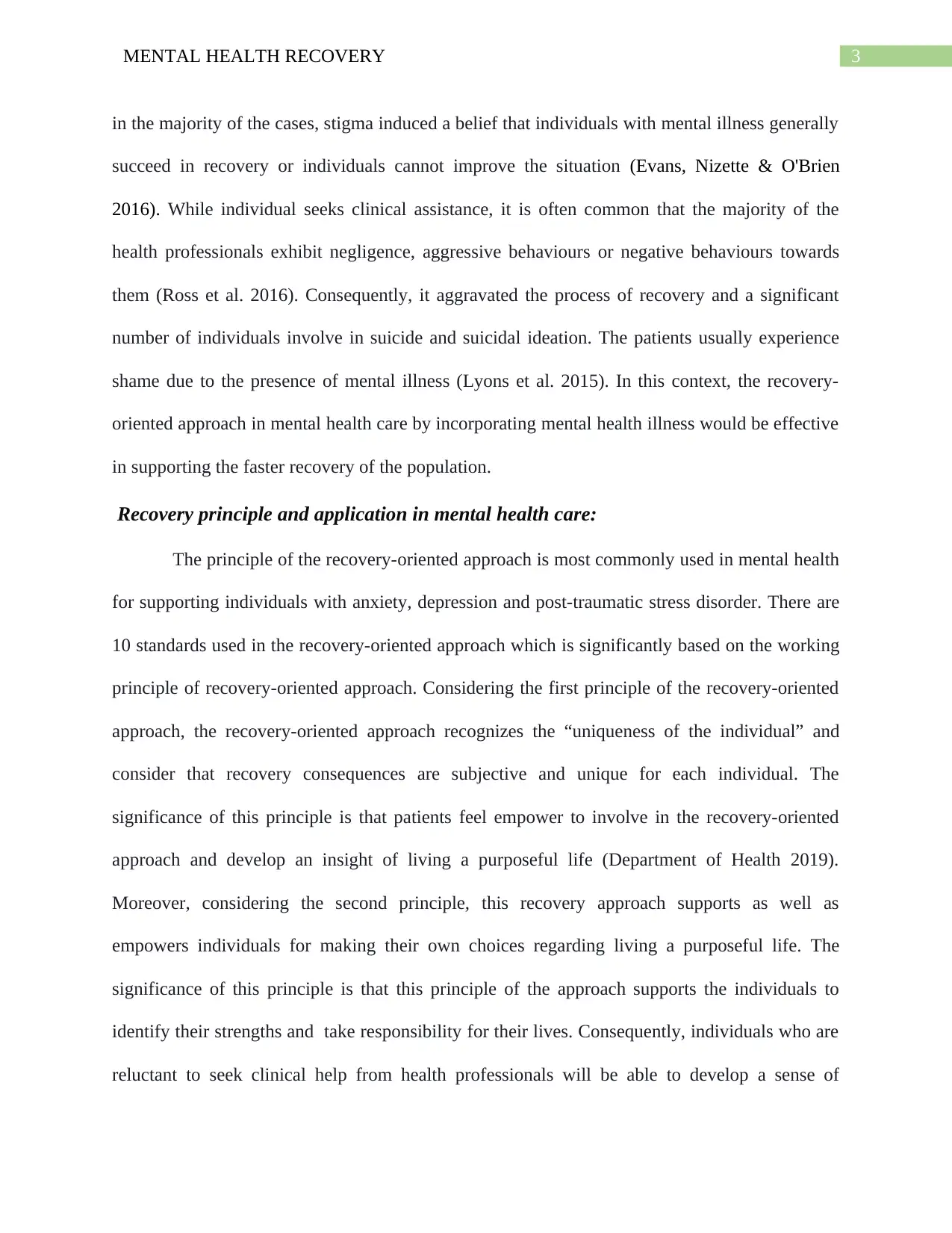
3MENTAL HEALTH RECOVERY
in the majority of the cases, stigma induced a belief that individuals with mental illness generally
succeed in recovery or individuals cannot improve the situation (Evans, Nizette & O'Brien
2016). While individual seeks clinical assistance, it is often common that the majority of the
health professionals exhibit negligence, aggressive behaviours or negative behaviours towards
them (Ross et al. 2016). Consequently, it aggravated the process of recovery and a significant
number of individuals involve in suicide and suicidal ideation. The patients usually experience
shame due to the presence of mental illness (Lyons et al. 2015). In this context, the recovery-
oriented approach in mental health care by incorporating mental health illness would be effective
in supporting the faster recovery of the population.
Recovery principle and application in mental health care:
The principle of the recovery-oriented approach is most commonly used in mental health
for supporting individuals with anxiety, depression and post-traumatic stress disorder. There are
10 standards used in the recovery-oriented approach which is significantly based on the working
principle of recovery-oriented approach. Considering the first principle of the recovery-oriented
approach, the recovery-oriented approach recognizes the “uniqueness of the individual” and
consider that recovery consequences are subjective and unique for each individual. The
significance of this principle is that patients feel empower to involve in the recovery-oriented
approach and develop an insight of living a purposeful life (Department of Health 2019).
Moreover, considering the second principle, this recovery approach supports as well as
empowers individuals for making their own choices regarding living a purposeful life. The
significance of this principle is that this principle of the approach supports the individuals to
identify their strengths and take responsibility for their lives. Consequently, individuals who are
reluctant to seek clinical help from health professionals will be able to develop a sense of
in the majority of the cases, stigma induced a belief that individuals with mental illness generally
succeed in recovery or individuals cannot improve the situation (Evans, Nizette & O'Brien
2016). While individual seeks clinical assistance, it is often common that the majority of the
health professionals exhibit negligence, aggressive behaviours or negative behaviours towards
them (Ross et al. 2016). Consequently, it aggravated the process of recovery and a significant
number of individuals involve in suicide and suicidal ideation. The patients usually experience
shame due to the presence of mental illness (Lyons et al. 2015). In this context, the recovery-
oriented approach in mental health care by incorporating mental health illness would be effective
in supporting the faster recovery of the population.
Recovery principle and application in mental health care:
The principle of the recovery-oriented approach is most commonly used in mental health
for supporting individuals with anxiety, depression and post-traumatic stress disorder. There are
10 standards used in the recovery-oriented approach which is significantly based on the working
principle of recovery-oriented approach. Considering the first principle of the recovery-oriented
approach, the recovery-oriented approach recognizes the “uniqueness of the individual” and
consider that recovery consequences are subjective and unique for each individual. The
significance of this principle is that patients feel empower to involve in the recovery-oriented
approach and develop an insight of living a purposeful life (Department of Health 2019).
Moreover, considering the second principle, this recovery approach supports as well as
empowers individuals for making their own choices regarding living a purposeful life. The
significance of this principle is that this principle of the approach supports the individuals to
identify their strengths and take responsibility for their lives. Consequently, individuals who are
reluctant to seek clinical help from health professionals will be able to develop a sense of
Paraphrase This Document
Need a fresh take? Get an instant paraphrase of this document with our AI Paraphraser
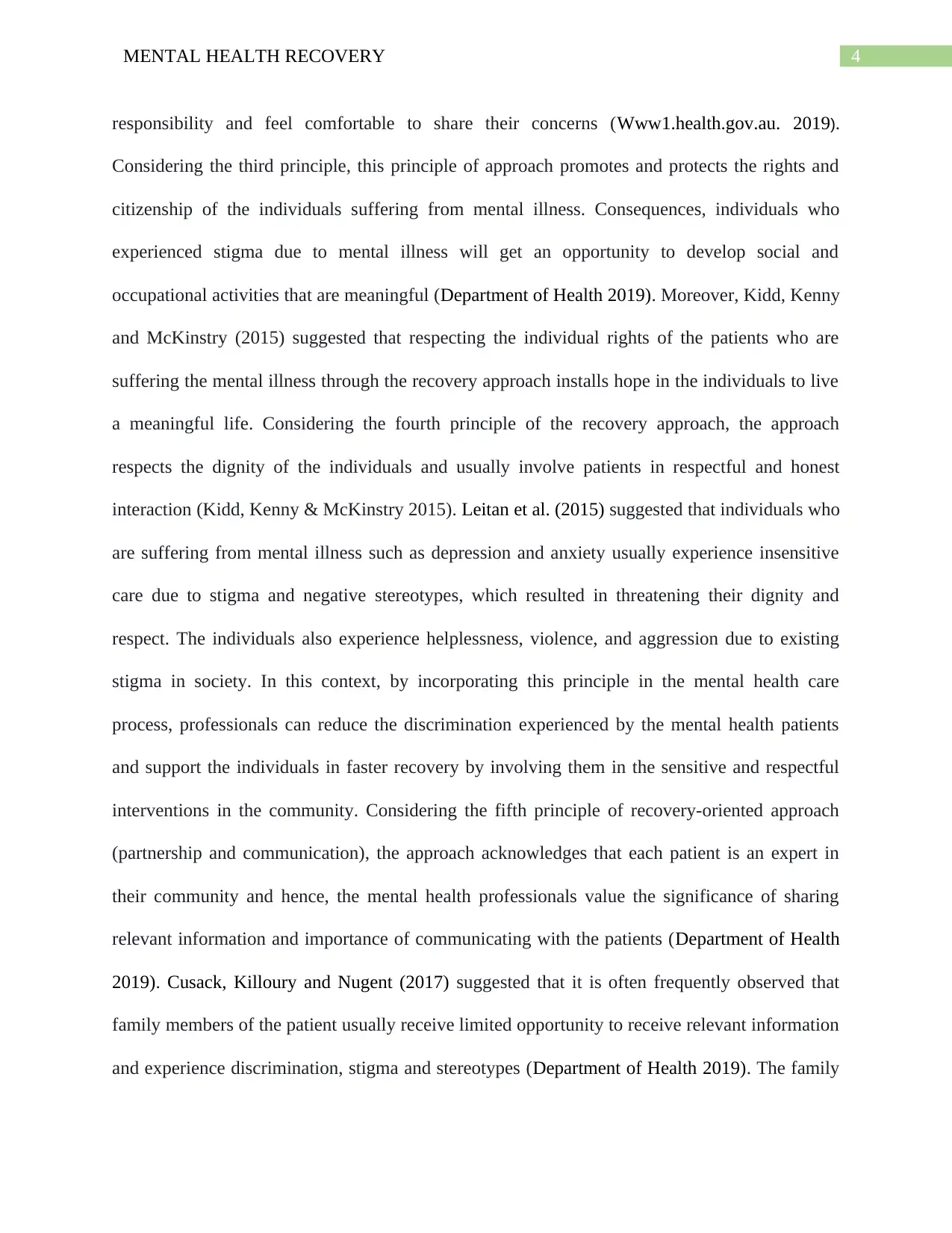
4MENTAL HEALTH RECOVERY
responsibility and feel comfortable to share their concerns (Www1.health.gov.au. 2019).
Considering the third principle, this principle of approach promotes and protects the rights and
citizenship of the individuals suffering from mental illness. Consequences, individuals who
experienced stigma due to mental illness will get an opportunity to develop social and
occupational activities that are meaningful (Department of Health 2019). Moreover, Kidd, Kenny
and McKinstry (2015) suggested that respecting the individual rights of the patients who are
suffering the mental illness through the recovery approach installs hope in the individuals to live
a meaningful life. Considering the fourth principle of the recovery approach, the approach
respects the dignity of the individuals and usually involve patients in respectful and honest
interaction (Kidd, Kenny & McKinstry 2015). Leitan et al. (2015) suggested that individuals who
are suffering from mental illness such as depression and anxiety usually experience insensitive
care due to stigma and negative stereotypes, which resulted in threatening their dignity and
respect. The individuals also experience helplessness, violence, and aggression due to existing
stigma in society. In this context, by incorporating this principle in the mental health care
process, professionals can reduce the discrimination experienced by the mental health patients
and support the individuals in faster recovery by involving them in the sensitive and respectful
interventions in the community. Considering the fifth principle of recovery-oriented approach
(partnership and communication), the approach acknowledges that each patient is an expert in
their community and hence, the mental health professionals value the significance of sharing
relevant information and importance of communicating with the patients (Department of Health
2019). Cusack, Killoury and Nugent (2017) suggested that it is often frequently observed that
family members of the patient usually receive limited opportunity to receive relevant information
and experience discrimination, stigma and stereotypes (Department of Health 2019). The family
responsibility and feel comfortable to share their concerns (Www1.health.gov.au. 2019).
Considering the third principle, this principle of approach promotes and protects the rights and
citizenship of the individuals suffering from mental illness. Consequences, individuals who
experienced stigma due to mental illness will get an opportunity to develop social and
occupational activities that are meaningful (Department of Health 2019). Moreover, Kidd, Kenny
and McKinstry (2015) suggested that respecting the individual rights of the patients who are
suffering the mental illness through the recovery approach installs hope in the individuals to live
a meaningful life. Considering the fourth principle of the recovery approach, the approach
respects the dignity of the individuals and usually involve patients in respectful and honest
interaction (Kidd, Kenny & McKinstry 2015). Leitan et al. (2015) suggested that individuals who
are suffering from mental illness such as depression and anxiety usually experience insensitive
care due to stigma and negative stereotypes, which resulted in threatening their dignity and
respect. The individuals also experience helplessness, violence, and aggression due to existing
stigma in society. In this context, by incorporating this principle in the mental health care
process, professionals can reduce the discrimination experienced by the mental health patients
and support the individuals in faster recovery by involving them in the sensitive and respectful
interventions in the community. Considering the fifth principle of recovery-oriented approach
(partnership and communication), the approach acknowledges that each patient is an expert in
their community and hence, the mental health professionals value the significance of sharing
relevant information and importance of communicating with the patients (Department of Health
2019). Cusack, Killoury and Nugent (2017) suggested that it is often frequently observed that
family members of the patient usually receive limited opportunity to receive relevant information
and experience discrimination, stigma and stereotypes (Department of Health 2019). The family
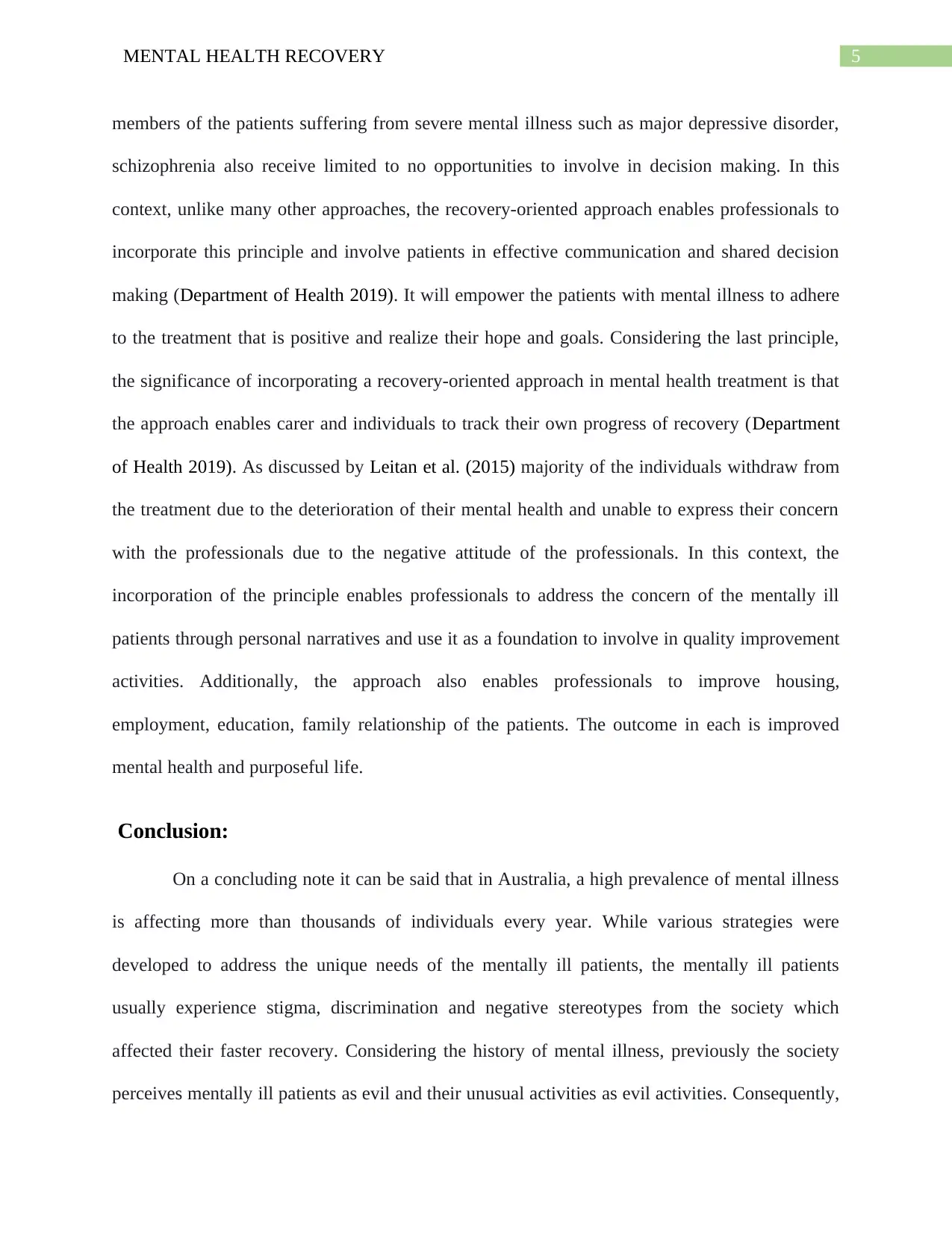
5MENTAL HEALTH RECOVERY
members of the patients suffering from severe mental illness such as major depressive disorder,
schizophrenia also receive limited to no opportunities to involve in decision making. In this
context, unlike many other approaches, the recovery-oriented approach enables professionals to
incorporate this principle and involve patients in effective communication and shared decision
making (Department of Health 2019). It will empower the patients with mental illness to adhere
to the treatment that is positive and realize their hope and goals. Considering the last principle,
the significance of incorporating a recovery-oriented approach in mental health treatment is that
the approach enables carer and individuals to track their own progress of recovery (Department
of Health 2019). As discussed by Leitan et al. (2015) majority of the individuals withdraw from
the treatment due to the deterioration of their mental health and unable to express their concern
with the professionals due to the negative attitude of the professionals. In this context, the
incorporation of the principle enables professionals to address the concern of the mentally ill
patients through personal narratives and use it as a foundation to involve in quality improvement
activities. Additionally, the approach also enables professionals to improve housing,
employment, education, family relationship of the patients. The outcome in each is improved
mental health and purposeful life.
Conclusion:
On a concluding note it can be said that in Australia, a high prevalence of mental illness
is affecting more than thousands of individuals every year. While various strategies were
developed to address the unique needs of the mentally ill patients, the mentally ill patients
usually experience stigma, discrimination and negative stereotypes from the society which
affected their faster recovery. Considering the history of mental illness, previously the society
perceives mentally ill patients as evil and their unusual activities as evil activities. Consequently,
members of the patients suffering from severe mental illness such as major depressive disorder,
schizophrenia also receive limited to no opportunities to involve in decision making. In this
context, unlike many other approaches, the recovery-oriented approach enables professionals to
incorporate this principle and involve patients in effective communication and shared decision
making (Department of Health 2019). It will empower the patients with mental illness to adhere
to the treatment that is positive and realize their hope and goals. Considering the last principle,
the significance of incorporating a recovery-oriented approach in mental health treatment is that
the approach enables carer and individuals to track their own progress of recovery (Department
of Health 2019). As discussed by Leitan et al. (2015) majority of the individuals withdraw from
the treatment due to the deterioration of their mental health and unable to express their concern
with the professionals due to the negative attitude of the professionals. In this context, the
incorporation of the principle enables professionals to address the concern of the mentally ill
patients through personal narratives and use it as a foundation to involve in quality improvement
activities. Additionally, the approach also enables professionals to improve housing,
employment, education, family relationship of the patients. The outcome in each is improved
mental health and purposeful life.
Conclusion:
On a concluding note it can be said that in Australia, a high prevalence of mental illness
is affecting more than thousands of individuals every year. While various strategies were
developed to address the unique needs of the mentally ill patients, the mentally ill patients
usually experience stigma, discrimination and negative stereotypes from the society which
affected their faster recovery. Considering the history of mental illness, previously the society
perceives mentally ill patients as evil and their unusual activities as evil activities. Consequently,
⊘ This is a preview!⊘
Do you want full access?
Subscribe today to unlock all pages.

Trusted by 1+ million students worldwide
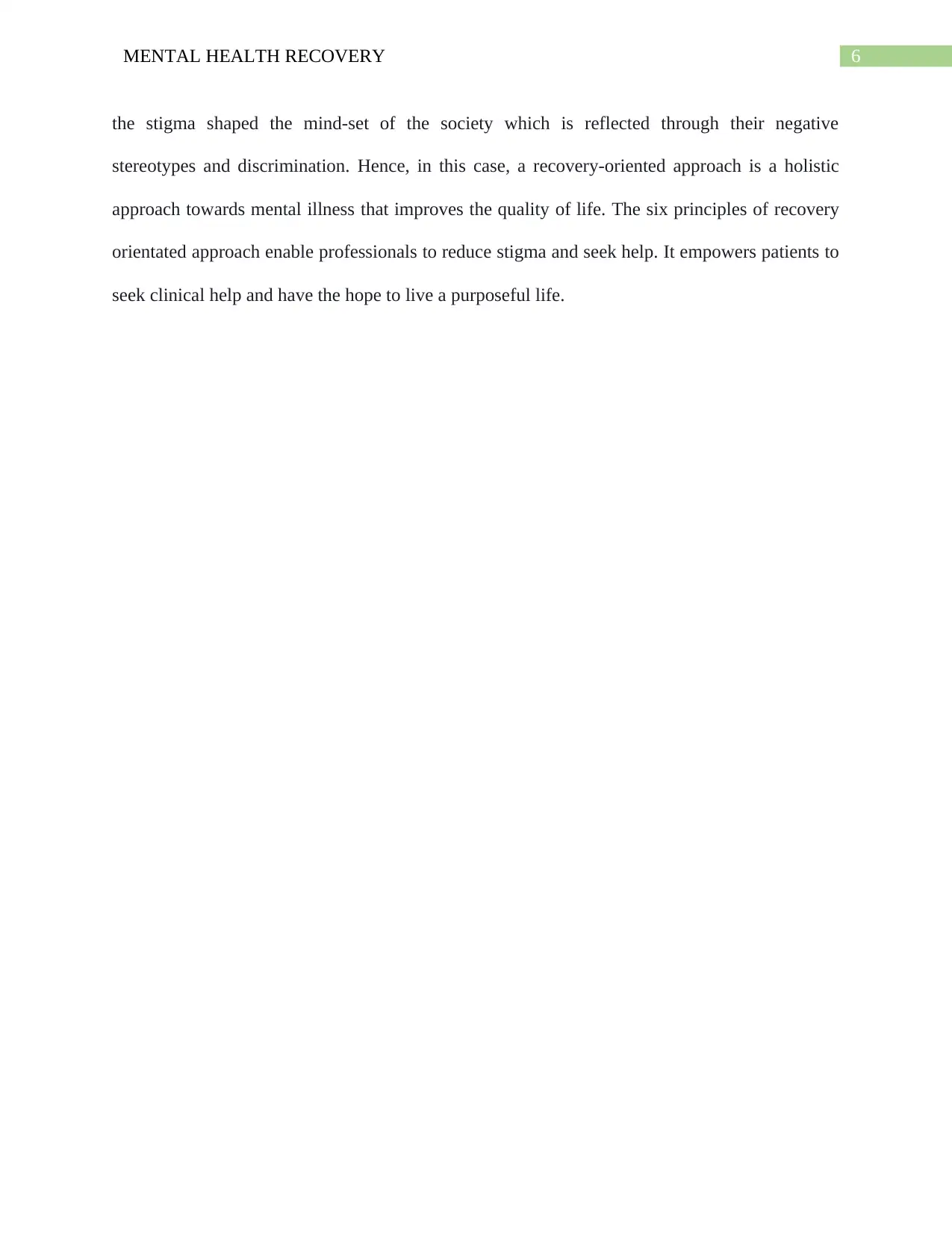
6MENTAL HEALTH RECOVERY
the stigma shaped the mind-set of the society which is reflected through their negative
stereotypes and discrimination. Hence, in this case, a recovery-oriented approach is a holistic
approach towards mental illness that improves the quality of life. The six principles of recovery
orientated approach enable professionals to reduce stigma and seek help. It empowers patients to
seek clinical help and have the hope to live a purposeful life.
the stigma shaped the mind-set of the society which is reflected through their negative
stereotypes and discrimination. Hence, in this case, a recovery-oriented approach is a holistic
approach towards mental illness that improves the quality of life. The six principles of recovery
orientated approach enable professionals to reduce stigma and seek help. It empowers patients to
seek clinical help and have the hope to live a purposeful life.
Paraphrase This Document
Need a fresh take? Get an instant paraphrase of this document with our AI Paraphraser
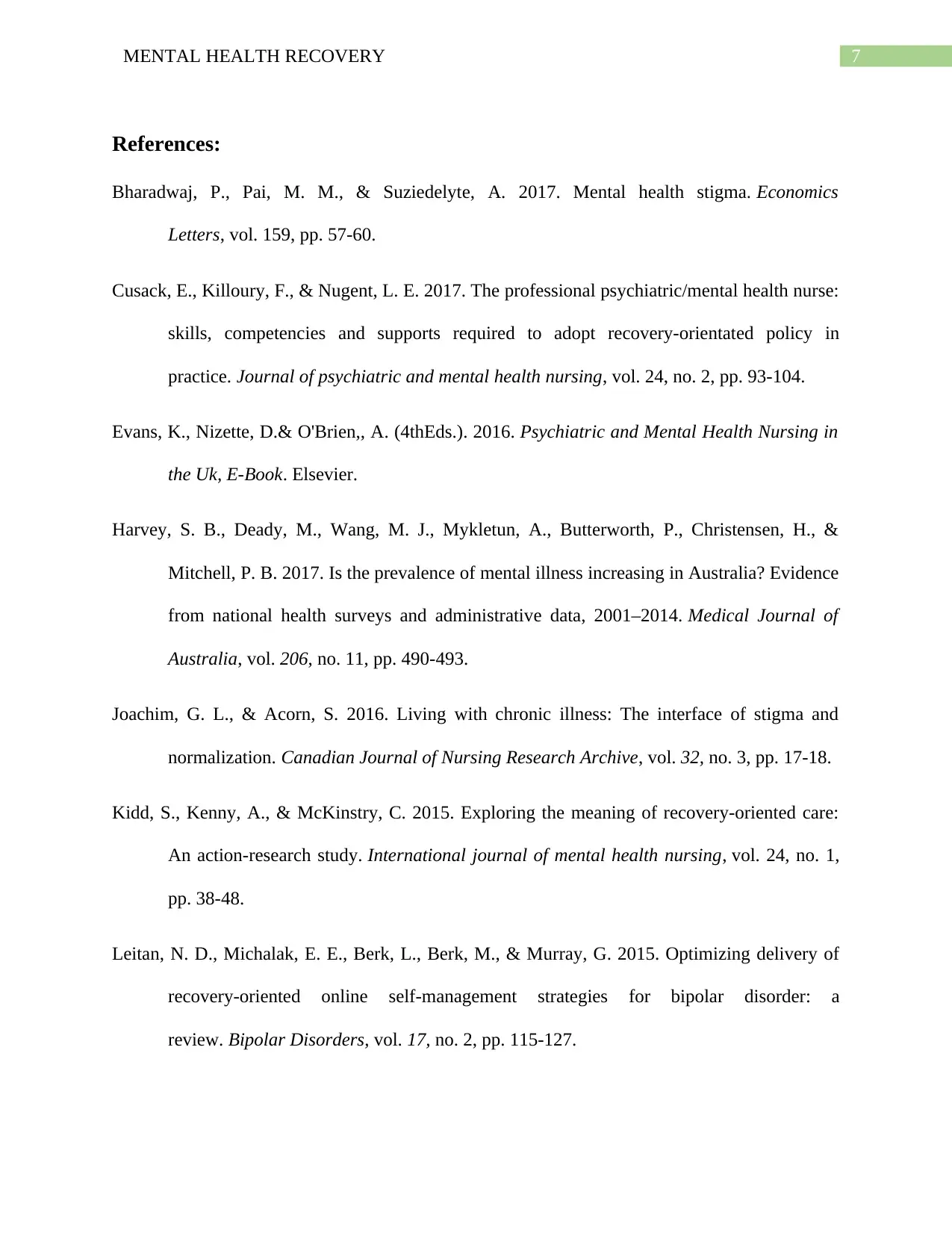
7MENTAL HEALTH RECOVERY
References:
Bharadwaj, P., Pai, M. M., & Suziedelyte, A. 2017. Mental health stigma. Economics
Letters, vol. 159, pp. 57-60.
Cusack, E., Killoury, F., & Nugent, L. E. 2017. The professional psychiatric/mental health nurse:
skills, competencies and supports required to adopt recovery‐orientated policy in
practice. Journal of psychiatric and mental health nursing, vol. 24, no. 2, pp. 93-104.
Evans, K., Nizette, D.& O'Brien,, A. (4thEds.). 2016. Psychiatric and Mental Health Nursing in
the Uk, E-Book. Elsevier.
Harvey, S. B., Deady, M., Wang, M. J., Mykletun, A., Butterworth, P., Christensen, H., &
Mitchell, P. B. 2017. Is the prevalence of mental illness increasing in Australia? Evidence
from national health surveys and administrative data, 2001–2014. Medical Journal of
Australia, vol. 206, no. 11, pp. 490-493.
Joachim, G. L., & Acorn, S. 2016. Living with chronic illness: The interface of stigma and
normalization. Canadian Journal of Nursing Research Archive, vol. 32, no. 3, pp. 17-18.
Kidd, S., Kenny, A., & McKinstry, C. 2015. Exploring the meaning of recovery‐oriented care:
An action‐research study. International journal of mental health nursing, vol. 24, no. 1,
pp. 38-48.
Leitan, N. D., Michalak, E. E., Berk, L., Berk, M., & Murray, G. 2015. Optimizing delivery of
recovery‐oriented online self‐management strategies for bipolar disorder: a
review. Bipolar Disorders, vol. 17, no. 2, pp. 115-127.
References:
Bharadwaj, P., Pai, M. M., & Suziedelyte, A. 2017. Mental health stigma. Economics
Letters, vol. 159, pp. 57-60.
Cusack, E., Killoury, F., & Nugent, L. E. 2017. The professional psychiatric/mental health nurse:
skills, competencies and supports required to adopt recovery‐orientated policy in
practice. Journal of psychiatric and mental health nursing, vol. 24, no. 2, pp. 93-104.
Evans, K., Nizette, D.& O'Brien,, A. (4thEds.). 2016. Psychiatric and Mental Health Nursing in
the Uk, E-Book. Elsevier.
Harvey, S. B., Deady, M., Wang, M. J., Mykletun, A., Butterworth, P., Christensen, H., &
Mitchell, P. B. 2017. Is the prevalence of mental illness increasing in Australia? Evidence
from national health surveys and administrative data, 2001–2014. Medical Journal of
Australia, vol. 206, no. 11, pp. 490-493.
Joachim, G. L., & Acorn, S. 2016. Living with chronic illness: The interface of stigma and
normalization. Canadian Journal of Nursing Research Archive, vol. 32, no. 3, pp. 17-18.
Kidd, S., Kenny, A., & McKinstry, C. 2015. Exploring the meaning of recovery‐oriented care:
An action‐research study. International journal of mental health nursing, vol. 24, no. 1,
pp. 38-48.
Leitan, N. D., Michalak, E. E., Berk, L., Berk, M., & Murray, G. 2015. Optimizing delivery of
recovery‐oriented online self‐management strategies for bipolar disorder: a
review. Bipolar Disorders, vol. 17, no. 2, pp. 115-127.
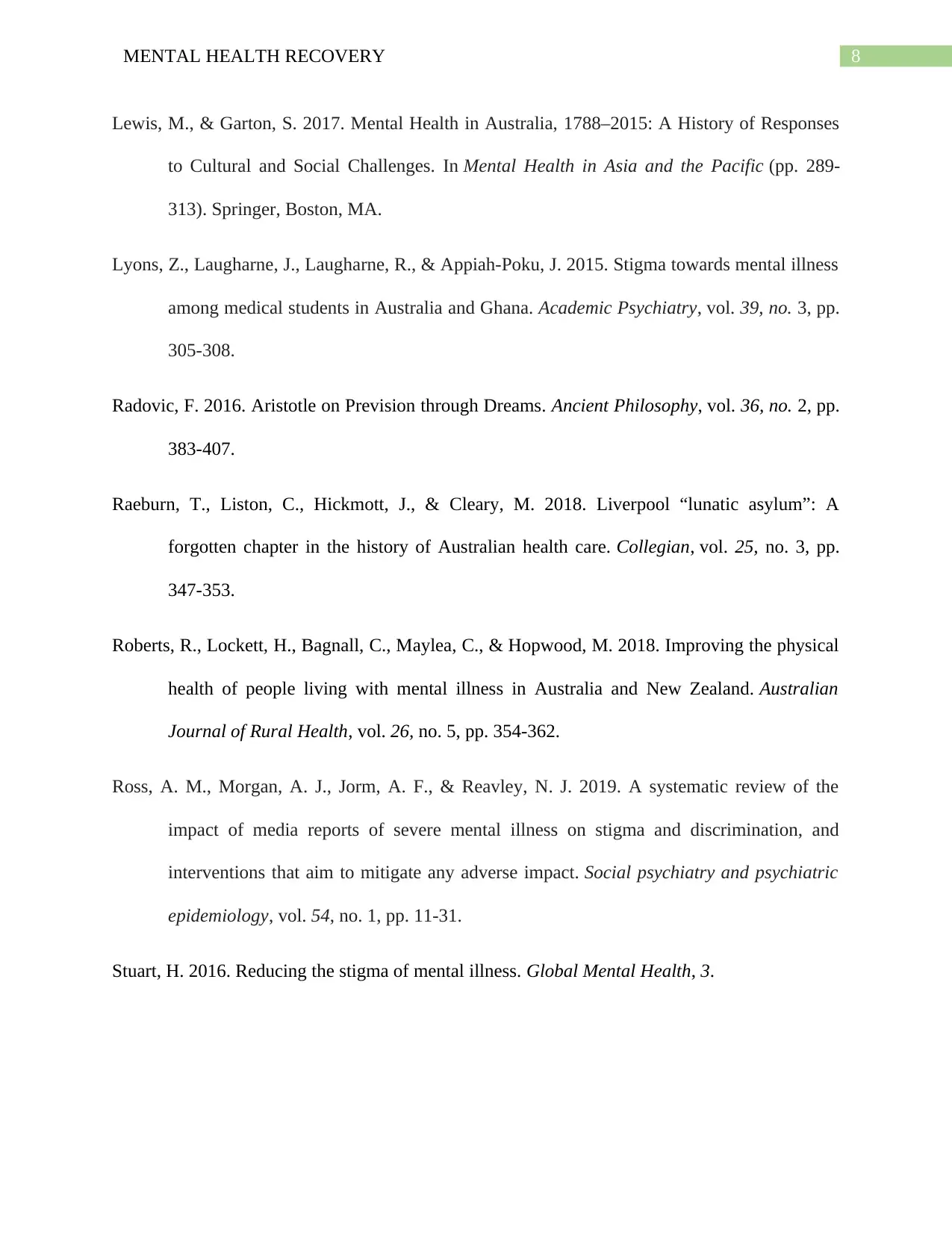
8MENTAL HEALTH RECOVERY
Lewis, M., & Garton, S. 2017. Mental Health in Australia, 1788–2015: A History of Responses
to Cultural and Social Challenges. In Mental Health in Asia and the Pacific (pp. 289-
313). Springer, Boston, MA.
Lyons, Z., Laugharne, J., Laugharne, R., & Appiah-Poku, J. 2015. Stigma towards mental illness
among medical students in Australia and Ghana. Academic Psychiatry, vol. 39, no. 3, pp.
305-308.
Radovic, F. 2016. Aristotle on Prevision through Dreams. Ancient Philosophy, vol. 36, no. 2, pp.
383-407.
Raeburn, T., Liston, C., Hickmott, J., & Cleary, M. 2018. Liverpool “lunatic asylum”: A
forgotten chapter in the history of Australian health care. Collegian, vol. 25, no. 3, pp.
347-353.
Roberts, R., Lockett, H., Bagnall, C., Maylea, C., & Hopwood, M. 2018. Improving the physical
health of people living with mental illness in Australia and New Zealand. Australian
Journal of Rural Health, vol. 26, no. 5, pp. 354-362.
Ross, A. M., Morgan, A. J., Jorm, A. F., & Reavley, N. J. 2019. A systematic review of the
impact of media reports of severe mental illness on stigma and discrimination, and
interventions that aim to mitigate any adverse impact. Social psychiatry and psychiatric
epidemiology, vol. 54, no. 1, pp. 11-31.
Stuart, H. 2016. Reducing the stigma of mental illness. Global Mental Health, 3.
Lewis, M., & Garton, S. 2017. Mental Health in Australia, 1788–2015: A History of Responses
to Cultural and Social Challenges. In Mental Health in Asia and the Pacific (pp. 289-
313). Springer, Boston, MA.
Lyons, Z., Laugharne, J., Laugharne, R., & Appiah-Poku, J. 2015. Stigma towards mental illness
among medical students in Australia and Ghana. Academic Psychiatry, vol. 39, no. 3, pp.
305-308.
Radovic, F. 2016. Aristotle on Prevision through Dreams. Ancient Philosophy, vol. 36, no. 2, pp.
383-407.
Raeburn, T., Liston, C., Hickmott, J., & Cleary, M. 2018. Liverpool “lunatic asylum”: A
forgotten chapter in the history of Australian health care. Collegian, vol. 25, no. 3, pp.
347-353.
Roberts, R., Lockett, H., Bagnall, C., Maylea, C., & Hopwood, M. 2018. Improving the physical
health of people living with mental illness in Australia and New Zealand. Australian
Journal of Rural Health, vol. 26, no. 5, pp. 354-362.
Ross, A. M., Morgan, A. J., Jorm, A. F., & Reavley, N. J. 2019. A systematic review of the
impact of media reports of severe mental illness on stigma and discrimination, and
interventions that aim to mitigate any adverse impact. Social psychiatry and psychiatric
epidemiology, vol. 54, no. 1, pp. 11-31.
Stuart, H. 2016. Reducing the stigma of mental illness. Global Mental Health, 3.
⊘ This is a preview!⊘
Do you want full access?
Subscribe today to unlock all pages.

Trusted by 1+ million students worldwide

9MENTAL HEALTH RECOVERY
www.blackdoginstitute.org.au. 2019. Retrieved 29 December 2019, from
https://www.blackdoginstitute.org.au/docs/defaultsource/factsheets/facts_figures.pdf?
sfvrsn=8
www.health.gov.au. 2019. Department of Health | Principles of recovery oriented mental health
practice. Retrieved 29 December 2019, from
https://www1.health.gov.au/internet/publications/publishing.nsf/Content/mental-pubs-i-
nongov-toc~mental-pubs-i-nongov-pri
www.blackdoginstitute.org.au. 2019. Retrieved 29 December 2019, from
https://www.blackdoginstitute.org.au/docs/defaultsource/factsheets/facts_figures.pdf?
sfvrsn=8
www.health.gov.au. 2019. Department of Health | Principles of recovery oriented mental health
practice. Retrieved 29 December 2019, from
https://www1.health.gov.au/internet/publications/publishing.nsf/Content/mental-pubs-i-
nongov-toc~mental-pubs-i-nongov-pri
1 out of 10
Related Documents
Your All-in-One AI-Powered Toolkit for Academic Success.
+13062052269
info@desklib.com
Available 24*7 on WhatsApp / Email
![[object Object]](/_next/static/media/star-bottom.7253800d.svg)
Unlock your academic potential
Copyright © 2020–2026 A2Z Services. All Rights Reserved. Developed and managed by ZUCOL.





